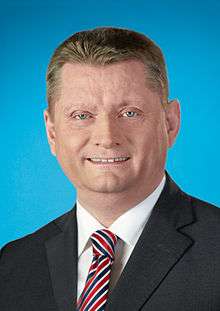Federal Ministry of Health (Germany)
| Bundesministerium für Gesundheit (BMG) | |
 | |
| Agency overview | |
|---|---|
| Formed | 1961 |
| Jurisdiction | Government of Germany |
| Headquarters |
Rochusstraße 1 53123 Bonn Friedrichstraße 108 10117 Berlin |
| Employees | 700 |
| Minister responsible |
|
| Agency executives |
|
| Website |
www |
The Federal Ministry of Health (German: Bundesministerium für Gesundheit), abbreviated BMG, is a cabinet-level ministry of the Federal Republic of Germany. Its headquarters are located in Bonn with a second major office in Berlin. It is the highest German federal government department responsible for health. The ministry is officially located in Bonn and with a second office, which houses the ministry's management, location in Berlin.[1]
History
The Federal Ministry of Health was founded in 1961; in 1969 it was merged with the Federal Ministry for Family and Youth to create the new Federal Ministry for Youth, Family and Health.
In 1991, the Federal Ministry of Health was restored. In 2002, it was expanded to include social affairs and renamed "Federal Ministry of Health and Social Security" (Bundesministerium für Gesundheit und Soziale Sicherung). In 2005 it was again reduced to health, and responsibility for social affairs was moved to the Federal Ministry of Labour and Social affairs (Bundesministerium für Arbeit und Soziales).


Ministers
Political Party: CDU CSU SPD Green FDP
| Name (Born-Died) |
Party | Term of Office | Chancellor (Cabinet) | ||
|---|---|---|---|---|---|
| Federal Minister for Health Affairs | |||||
| Elisabeth Schwarzhaupt (1901–1986) |
CDU | 14 November 1961 | 30 November 1966 | Adenauer (IV • V) Erhard (I • II) | |
| Käte Strobel (1907–1996) |
SPD | 1 December 1966 | 21 October 1969 | Kiesinger (I) | |
| Federal Minister for Youth, Family and Health | |||||
| Käte Strobel (1907–1996) |
SPD | 22 October 1969 | 15 December 1972 | Brandt (I) | |
| Dr. Katharina Focke (b. 1922) |
SPD | 15 December 1972 | 14 December 1976 | Brandt (II) Schmidt (I) | |
| Antje Huber (b. 1924) |
SPD | 16 December 1976 | 28 April 1982 | Schmidt (II • III) | |
| Anke Fuchs (b. 1937) |
SPD | 28 April 1982 | 1 October 1982 | Schmidt (III) | |
| Dr. Heiner Geißler (b. 1930) |
CDU | 4 October 1982 | 26 September 1985 | Kohl (I • II) | |
| Prof. Rita Süssmuth (b. 1937) |
CDU | 26 September 1985 | 5 June 1986 | Kohl (II) | |
| Federal Minister for Youth, Family, Women and Health | |||||
| Prof. Rita Süssmuth (b. 1937) |
CDU | 6 June 1986 | 9 December 1988 | Kohl (II • III) | |
| Prof. Ursula Lehr (b. 1930) |
CDU | 9 December 1988 | 18 January 1991 | Kohl (III) | |
| Federal Minister for Health | |||||
| Gerda Hasselfeldt (b. 1950) |
CSU | 18 January 1991 | 6 May 1992 | Kohl (IV) | |
| Horst Seehofer (b. 1949) |
CSU | 6 May 1992 | 26 October 1998 | Kohl (IV • V) | |
| Andrea Fischer (b. 1960) |
Green | 27 October 1998 | 12 January 2001 | Schröder (I) | |
| Ulla Schmidt (b. 1949) |
SPD | 12 January 2001 | 22 October 2002 | ||
| Federal Minister for Health and Social Security | |||||
| Ulla Schmidt (b. 1949) |
SPD | 22 October 2002 | 22 November 2005 | Schröder (II) | |
| Federal Minister for Health | |||||
| Ulla Schmidt (b. 1949) |
SPD | 22 November 2005 | 27 October 2009 | Merkel (I) | |
| Philipp Rösler (b. 1973) |
FDP | 28 October 2009 | 12 May 2011 | Merkel (II) | |
| Daniel Bahr (b. 1976) |
FDP | 12 May 2011 | 17 December 2013 | ||
| Hermann Gröhe (b. 1961) |
CDU | 17 December 2013 | Incumbent | Merkel (III) | |
Responsibilities of the Federal Ministry of Health
- See also: Health in Germany
The Federal Ministry of Health is responsible for:
- maintaining the effectiveness and efficiency of the statutory health insurance and long-term care insurance systems
- maintaining and enhancing the quality of the health care system
- strengthening the interests of patients
- maintaining economic viability and stabilization of contribution levels
- preventive and prophylactic healthcare
- the Protection against Infection Act (Infektionsschutzgesetz, or IfSG)
- establishing guidelines for the manufacture, clinical trial, approval, distribution channels and monitoring of medicines and medical devices. The objectives are:
- quality, medical efficacy and safety
- safety of biological medical products such as blood products
- narcotics and addiction risk prevention
- prevention, rehabilitation and disability policy
- medical and occupational rehabilitation
- disability law
- providing assistance to the disabled and promoting their interests
- European and international health policy, including the work of the Federal Government Narcotics Officer and the patients' ombudsman.
Supervisory role
The Federal Ministry of Health is responsible for the comprehensive[2] (disciplinary) supervision of the following governmental institutions:
- Federal Institute for Drugs and Medical Devices (German: Bundesinstitut für Arzneimittel und Medizinprodukte, abbreviated BfArM) in Bonn
- Federal Centre for Health Education (German: Bundeszentrale für gesundheitliche Aufklärung, abbreviated BZgA) in Cologne
- German Institute of Medical Documentation and Information (German: Deutsches Institut für medizinische Dokumentation und Information, abbreviated DIMDI) in Cologne
- Paul-Ehrlich-Institut (PEI), the Federal Institute for Vaccines and Biomedicines in Langen, Hesse
- Robert Koch Institute (RKI) in Berlin
The Federal Ministry of Health is also responsible for the non-disciplinary supervision[3] of
- the German Federal (Social) Insurance Authority (Bundesversicherungsamt).
and the legal supervision[4] of the umbrella organizations of the statutory health insurance schemes.
See also
- In Europe - European Commission - Directorate General for Health and Consumer Protection (SANCO)
References
- ↑ Federal Ministry of Health http://www.bmg.bund.de/ministerium/english-version/ministry.html Official website] (English) retrieved 1-Jun-2012
- ↑ Fach- und Dienstaufsicht, includes review of decisions and behavior of staff of those institutions
- ↑ Fachaufsicht, includes review of decisions of staff of those institutions (not merely their legality)
- ↑ Rechtsaufsicht, includes review of legality of actions of those institutions
External links
- Federal Ministry of Health official web site (German)
- Federal Ministry of Health official web site (English)
- European Observatory on Health Systems and Policies > Country information Germany
